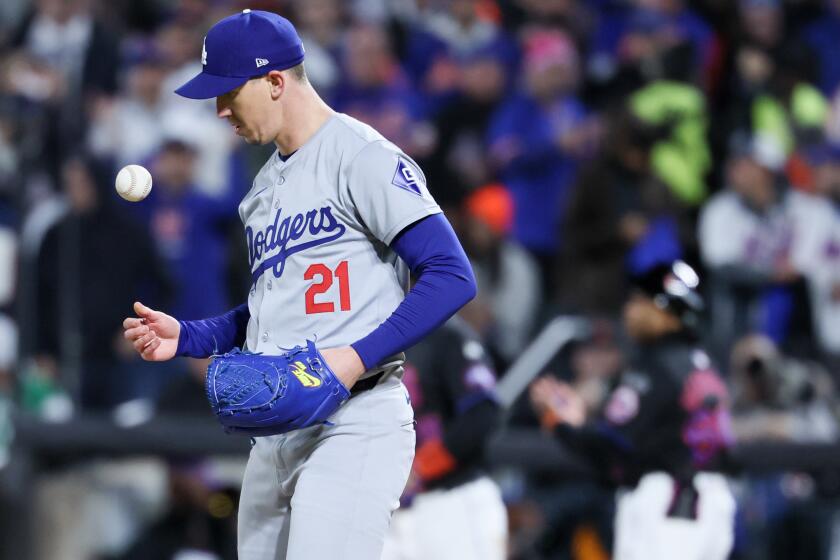Dodgers brass finally address Trevor Bauer release, but leave several key questions unanswered

- Share via
Almost a month since he was released from the organization, Trevor Bauer remains a delicate subject for Dodgers brass.
On Wednesday, club president Stan Kasten and president of baseball operations Andrew Friedman addressed the team’s decision to part ways with the embattled pitcher during a meeting with local reporters at Dodger Stadium, the first time club officials have spoken publicly about Bauer since his release last month.
However, they also left several pressing questions unanswered, most notably the details of a meeting Dodgers executives had with Bauer the day before announcing they would release him.
“We feel good about our process and what led us to where we are now,” Friedman said.
“I stand by our decision,” Kasten added. “I’m very comfortable with it.”
Before Wednesday, the Dodgers’ only public statement regarding Bauer’s release came in a 117-word news release announcing the pitcher would no longer be part of the organization after serving a 194-game suspension for violating Major League Baseball’s domestic violence and sexual assault policy.
The Dodgers were unable to trade Trevor Bauer by Thursday’s deadline and he was released. He will find a hostile market in search for a new team.
Though Bauer’s suspension was reduced from the original 324-game ban administered by the league — the result of a drawn-out appeal to an independent arbitrator, who deemed Bauer eligible to pitch in 2023 after spending the previous season and a half on administrative leave — it still marked the longest suspension under the league’s seven-year-old policy.
Friedman cited that Wednesday as a key factor in the Dodgers’ decision to part ways with the former Cy Young Award winner, who is still owed a reduced salary of $22.5 million from the club this season.
Yet, even after Bauer’s suspension was settled on Dec. 22, the Dodgers didn’t announce they’d released him until Jan. 6, the final day of the two-week period they had to either cut the pitcher or put him back on their active roster.
So why did it take so long?
“We took the time to get as much input as we could to be sure we were making the right decision,” Kasten said, adding that the timing of the holiday season contributed to the delayed decision. “That’s what we did. We feel we did make the right decision.”
Part of the Dodgers’ process, Kasten confirmed Wednesday, was having team officials meet with Bauer in Arizona on Jan. 5 — before the club had finalized its decision.
Bauer previously claimed in a statement that, during that meeting, unnamed members of “Dodgers leadership” told the pitcher “that they wanted me to return and pitch for the team this year.”
The Dodgers were unable to trade Trevor Bauer by Thursday’s deadline and he was released. He will find a hostile market in search for a new team.
While that account was quickly disputed by people familiar with the situation but unauthorized to speak publicly, Kasten declined to address it directly Wednesday.
“I’m not gonna get into contradicting or agreeing with anything about what was supposed to be a private conversation,” Kasten said. “I’ll just say, within a very short time we came back and made our decision. I think that speaks for itself.”
Asked if there was anything Bauer — who has denied allegations of sexual assault from multiple women — could have said or committed to at that meeting that would have swayed the Dodgers to bring him back, Kasten again deflected.
“I think we all had strong feelings and until we decided — those of us who made this decision — until we decided, I guess anything was possible,” Kasten said. “But I think we all had a strong feeling all the way through the process of the right way to handle this.”
Kasten also declined to disclose who represented the Dodgers at the meeting, and what topics they discussed with Bauer.
“I understand the question, but we wouldn’t have even talked about the meeting except someone else put it out there,” Kasten said. “So I don’t want to talk about what happened at the meeting. I don’t think that’s fair. I don’t want to talk about what went on, what was discussed, what wasn’t discussed or who was there. But we did hear from him. I thought it was the right thing to do. I’m happy that we did it, along with everything else that we did to reach the best decision that we could.”
Kasten insisted releasing Bauer was “unanimous among the people that are charged with having to make this decision” — but once again declined to say which members of the organization were part of that group.
“It was an organizational decision,” Kasten said, noting that the team solicited input from players, coaches, staff and even some fans during the process.
“I will say I’m responsible for everything that happens here,” Kasten added. “But everyone who needed to be involved was involved, was included in the discussion all along the way. It was unanimous at the end for sure. And as I said, and will keep saying, we feel strongly we made the right decision.”
Dodgers officials hadn’t previously addressed Bauer’s release, citing MLB rules limiting what teams can say about active free agents. Bauer could also hypothetically file a grievance against the Dodgers if they make comments that diminish his value.
At Wednesday’s meeting, chief marketing officer Lon Rosen and general manager Brandon Gomes also fielded questions from reporters.
Gomes and Friedman will not be at the club’s FanFest event Saturday at Chavez Ravine because of travel conflicts.
Complete coverage from the Los Angeles Times on the Dodgers’ decision to cut ties with embattled pitcher Trevor Bauer.
Friedman on Wednesday didn’t say whether he regretted signing Bauer to a three-year, $102 million contract two offseasons ago, but in hindsight acknowledged that “the way it played out is obviously not what we thought.”
From a baseball standpoint, Friedman also claimed the Bauer situation didn’t hinder the club’s offseason activities, even though the money the Dodgers owe him this year all but assures the franchise of surpassing MLB’s luxury tax threshold for a third consecutive season.
“Obviously, we didn’t know what the outcome [of Bauer’s suspension] would be,” Friedman said. “But we pursued some things that were more aggressive this winter that didn’t line up.”
Ultimately, the club settled for a series of smaller, short-term additions that left some factions of the fanbase unsatisfied during a winter that saw stars such as Trea Turner, Justin Turner and Cody Bellinger all depart in free agency — and Bauer’s situation continue to dominate much of the conversation surrounding the club.
“With the way things have transpired, we feel good about our decision to move on [from Bauer] and focus on the guys that we have,” Friedman said. “We feel like we’re gonna have a really good team this year.”
More to Read
Are you a true-blue fan?
Get our Dodgers Dugout newsletter for insights, news and much more.
You may occasionally receive promotional content from the Los Angeles Times.












